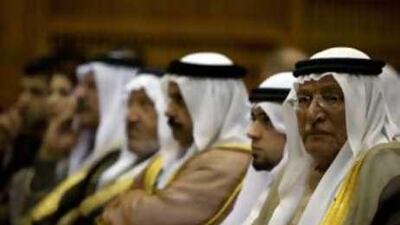DAMASCUS // Iraqi opposition and resistance groups have renewed their demands for an end to all negotiations with the United States while US troops remain on Iraqi soil. "We reject any kind of agreement that prolongs the occupation for so much as a day," said Shamil Rassam, chairman of the Iraqi Popular Forces, an anti-occupation group with offices in Syria. "The occupation must be ended immediately and there can be no compromises until the last American soldier has left the country."
Talks continue between the government in Baghdad and the Bush administration over a controversial status of forces agreement, a treaty that would lay out US military legal rights to remain in Iraq. Discussions appear to have stalled over the Iraqi government's insistence the agreement include a timetable for US troop withdrawal, something Washington has insisted would aid insurgents. The United States has been pushing for a long-term deal to be concluded by the end of the month, and certainly before the next US president takes over the White House in January.
That now seems unlikely and, instead, a temporary one-year agreement between Iraq and the United States is being considered. It would allow basic US military operations to continue after the year-end expiration of the UN mandate that currently gives them legal cover. Despite the Iraqi government's taking a harder negotiating line than many expected, Iraqi tribes and political organisations with representatives in Damascus have demanded a zero tolerance strategy: no deals until all US troops are pulled out.
"The security agreement is just a plan to turn Iraq into an American colony forever," Mr Rassam said. "The only deal that is acceptable to us is one that calls for complete unconditional withdrawal." Sheikh Ra'ad Kadhamyi, the head of the Sadrist offices outside of Iraq, said the proposed Iraqi-US deal must include a clear timetable for a rapid US withdrawal. "Everything we have seen of these agreements so far bring shame to the Iraqi people and will hand control of our country and its resources to the Americans," he said.
The Sadrists, a nationalist Shiite movement headed by cleric Muqtada al Sadr, have been opposed to the US presence since the aftermath of the 2003 invasion, and have frequently fought pitched battles both against US and Iraqi government forces. Sheikh Kadhamyi dismissed suggestions that Nouri al Maliki, the Iraqi prime minister, was taking a tough stance with the United States over the status agreement.
"Maliki is an agent for the Americans and the occupation. He and his government are only there because of the Americans and if the Americans left they know they would be kicked out of office." The Southern Iraqi Tribes Federation also called for negotiations to be frozen. "Talks and legal deals implies an agreement between equals," said a federation official, Mohammed Kadi. "We're not opposed to entering into agreements with powerful countries like America, but they have to be done on an a foundation of equality. That can't happen when you're under what is turning into a long-term occupation."
Mr Kadi said Iraqis increasingly believed the United States was trying to establish an unending military presence in the country. "It's obvious they've just come to take our resources and to spread their influence. It has been more than five years now and there has still been nothing like real reconstruction going on. They're not there for Iraqis' sakes." Last week Damascus hosted a conference of Iraqi groups opposed to the US presence. Dozens of Iraqis from various sects and backgrounds attended the meetings.
While other Arab states have reconciled themselves to having the US army present in Iraq, Syria does not want US soldiers based on its doorstep and supports calls for them to leave. Washington accuses Syria of hosting insurgents and of allowing them to cross the border to carry out attacks on US and Iraqi government interests. Syria insists it has taken all possible steps to prevent the flow of fighters but that it is impossible to completely seal the 600km border, which is crisscrossed by ancient smuggling routes.
Damascus also says the United States and Iraq must make greater efforts on their side of the border to prevent insurgents and extremists crossing. It was largely unpoliced on the Iraqi side until early 2006. Syria is thought to have hundreds of religious extremists in its prisons, including those who were captured returning from fighting the US military in Iraq. Hussein Jummah, chairman of the Arab Writers Union, said Syria was "honoured" to host Iraqi opposition members. "It's an honour for us in Syria to be part of any Arab National resistance," Mr Jummah said. "It's an honour for us to shake hands with the Iraqi resistance who sacrifice their blood to raise the Iraqi flag."
Mr Jummah called the Bush administration "the worse government in the history of mankind" and said no Iraqi with any dignity could accept continuing US military presence. @Email:psands@thenational.ae

